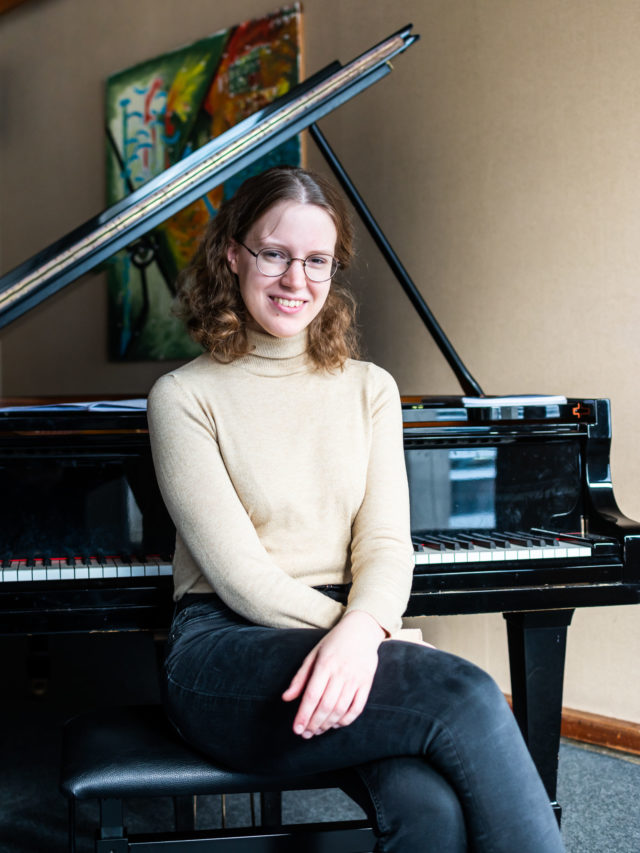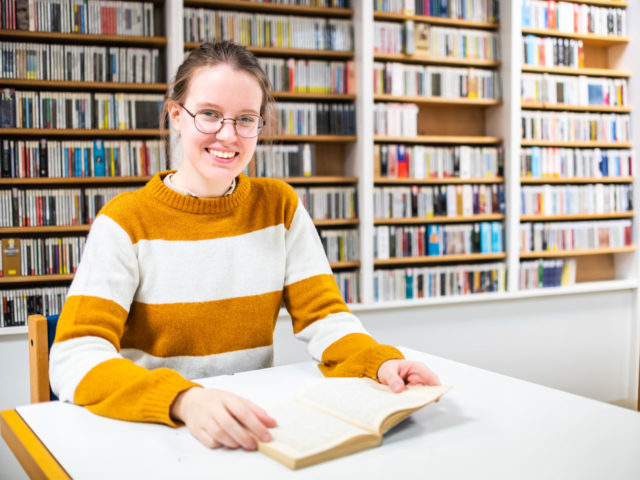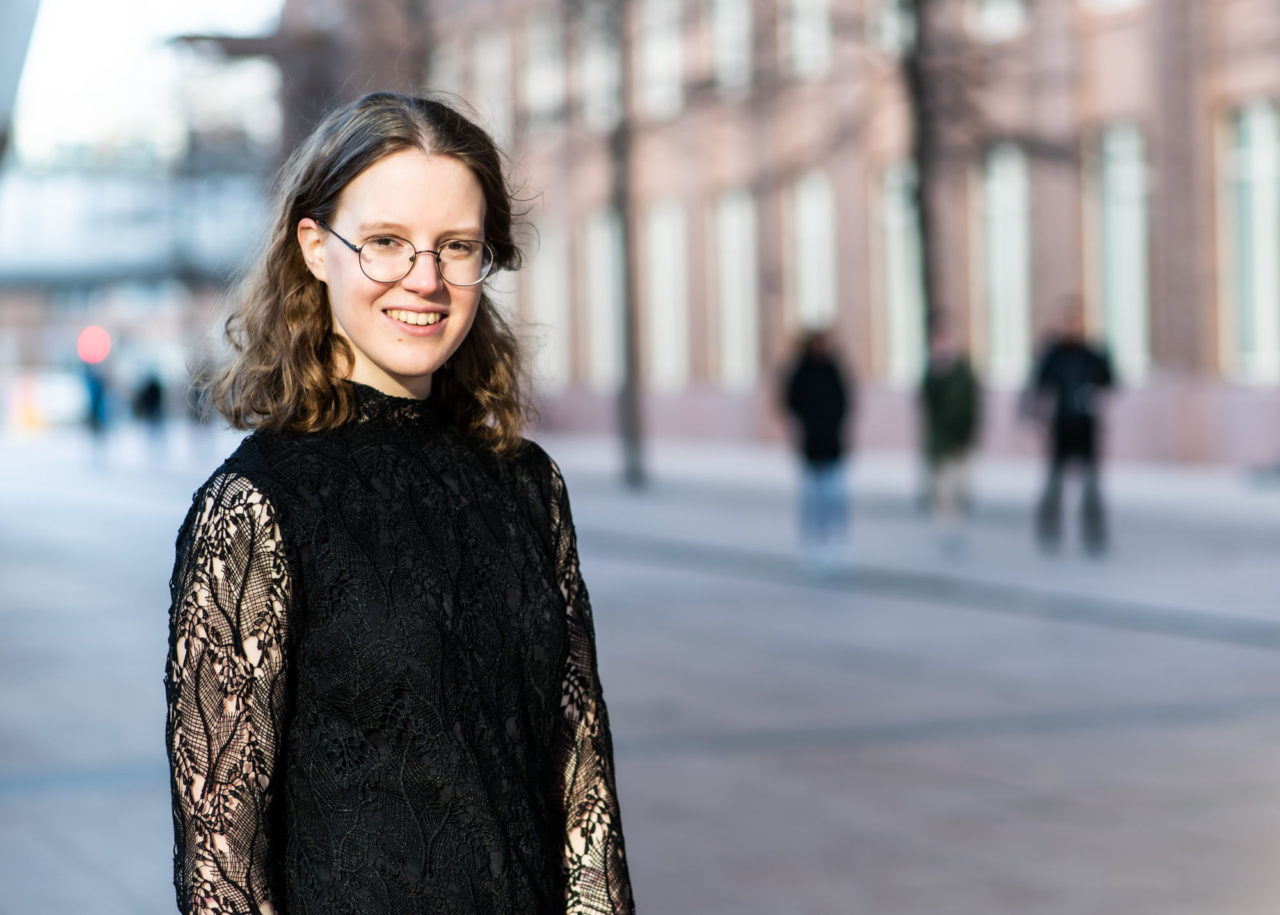Alexandra - 'Your horizons need to be very broad to study theory'
14 December 2020
‘Music cannot be captured in words, but that is precisely what we try to do.’ Alexandra is a third-year student in the Bachelor programme in Theory of Music (Music Theory department). She already has a Bachelor’s degree in classical piano and, in addition to her theory studies, is also following a pre-Master’s programme in piano. Here she talks about her passion for theory and the importance of following your own path and networking.
Dare to follow your own path
‘I would love to be a concert pianist as well as a teacher. In my view, theory is one of the nicest courses you can teach, and I already notice how happy I am to talk about my great passion for it.’ Alexandra says her artistic identity is a combination of performance (she has been playing piano since she was five) and theory. Her experience as a pianist reinforces her vision in terms of theory, while her knowledge also helps to make her a better pianist. ‘Theory might seem a little dry to some people, but to me it is nothing of the sort. When you write about music, it always reflects a part of who you are: your interpretation and ideas are very important, and that makes writing about music very special.’
‘You must have the courage to pursue your interests. At the Conservatoire you can do that. This is not a time to hold back. Use the contacts and the time you have now to find your own way. At least, that is what I try to do. I consciously chose to study theory in addition to my piano studies. And here I am really challenged to form my own vision and to follow my own path. The Conservatoire provides tremendous support in that: my teachers carefully consider my personal interests and what I need to achieve my goals.’

Broad horizons
Alexandra discovered her deep passion for theory while studying for her Bachelor of Classical Piano in Zwolle, but there was no emphasis on it in the programme. ‘It was always me who asked for more homework and I did a lot of self-study. But you can’t do everything yourself, so I also decided to study theory and am so happy I made that choice.’ Although Alexandra is following the pre-Master’s programme in classical piano in Amsterdam, the Royal Conservatoire in The Hague was always her first choice to study theory. ‘I felt the pleasant atmosphere the moment I arrived in The Hague. Although the admissions procedure was conducted online, I could immediately feel that ambience. And The Hague is known for its strong theory department. I sat the entrance exam and was delighted to learn that I was good enough to enter the programme in the third year.’
‘The curriculum is comprehensive. Your horizons need to be very broad to study theory, but they are certainly further expanded during your studies. To make the most of the programme, you need to have an open attitude and step outside your comfort zone. But the great thing is that even within the extensive curriculum, there is always room to deepen your knowledge of a subject that is of particular interest to you.’

Networks
‘Having a network is extremely important to me. As a pianist, people have to know you if you are going to be asked to perform. But a network is also important with theory. The Royal Conservatoire certainly helps me to build a network. We recently took part in a two-day master class in Muziek als Vak, given by two Hungarian teachers. It was really inspiring. You meet so many new people at such an event. You are also encouraged to do exchanges under the ERASMUS programme. If I ever want to publish something or teach somewhere, I will again have to expand my network there. You have to shape your own future: it is always your own actions that bring you further. If I write a study that I want to publish, I will have to arrange it myself. The future doesn’t come to you, you have to go after it yourself.'
Soulmates
‘The atmosphere at the Royal Conservatoire is fantastic. It is not a collection of individual departments or separate courses. Everyone collaborates. It is a stimulating and inspiring environment. The teachers and students are very good, and it is really pleasant to have them around you. It is also a very open environment: you can always ask questions and we are not competing with each other. You are listened to. There are very few students in my year – there are sometimes only four of us in a class – so we are a very close-knit group. Because it is such a specific field of study, they are real soulmates: people with the same attitude, ideas and interests. I am really happy to be here.’
Interested? Go to our 'Apply now' pages for more information about the Royal Conservatoire and the Music Theory Department.





